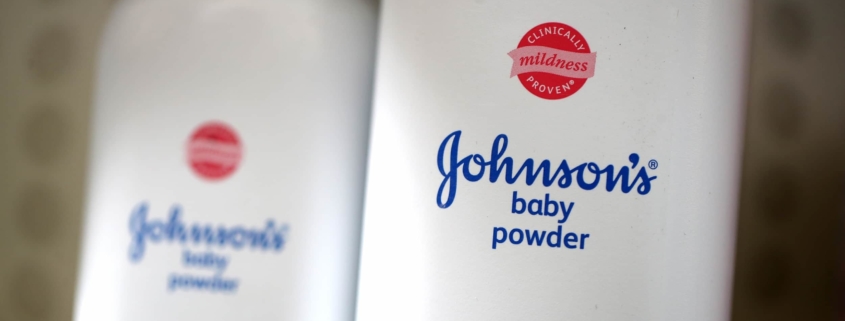Gold Bond Talcum Powder Joins Cancer-Link Litigation
As of July of 2021, Johnson & Johnson continues to insist that its baby powder is safe, despite pulling the original powder from the market, replacing the talc with cornstarch, a $417 million jury award, and nearly $4.7 billion awarded to a group of women who developed ovarian cancer.
For decades, the problem has been known even before tens of thousands of women filed personal injury lawsuits. Talc, the active ingredient in talcum powder, is mined near a naturally occurring mineral, asbestos, a known carcinogen with no known safe exposure level.
J&J’s internal documents show the company debated labeling the powder and warning against using it in the genital area as a deodorant, on sanitary napkins, or condoms.
Talcum powder is intended to be used externally. Still, researchers found when it’s used near the genitals, talc particles travel up the reproductive system landing dangerously close to the ovaries.
Instead of warning women, J&J kept quiet, the very act that has enraged juries who then awarded millions to the injured plaintiffs.
J&J took its talcum-based baby powder off the market in May of last year, replacing it with a cornstarch-based baby powder. Retailers were allowed to continue to sell their remaining products on store shelves. Meanwhile, J&J continues to distribute its talc-based powder outside of the U.S. and Canada.
You can also still find the original talc-containing J&J Baby Powder on Amazon.
Gold Bond
Like J&J’s Baby Powder, Gold Bond Medicated Body Powder, and Medicated Extra Strength Body Powder, are used to relieve an itch, rash, and absorb moisture. They both also contain talc.
Shopping on Amazon, you can now find some other Gold Bond options that have a prominent display on the top of the label that says on the front “Talc-Free.”
Gold Bond is a subsidiary of the French pharmaceutical company Sanofi. Besides menthol and zinc oxide, Gold Bond Baby Powder is now made with cornstarch.
Chattem is facing many lawsuits filed by women who have developed ovarian cancer.
Unlike the J&J cases where company documents confirm J&J knew asbestos could be contained in its baby powder, Gold Bond may not have the exact roadmap to litigation. Then there is the question of whether asbestos causes cancer. The International Agency for Research on Cancer does not believe that powders that contain talcum are inherently dangerous; the European Union has banned talc in health and beauty products.
Meanwhile, the U.S. Food and Drug Administration (FDA) has not stated its opinion on the risks that talc poses in health and beauty products. When J&J removed its talcum-containing baby powder last year, it did so of its own accord voluntarily and not as the result of an FDA ban. The FDA rarely orders pharmaceutical companies to remove products for fear of litigation.
Consumers Be Warned
In 2014, the estate of a woman who died of ovarian cancer filed a lawsuit against the maker of Gold Bond and J&J and Imerys Talc America, the talc supplier.
Janice Chakalos had used talcum powder for decades and died of ovarian cancer in 2012. She was 63 years old. Her husband’s suit accused the manufacturers of failing to warn about the emerging evidence linking the powder to ovarian cancer. It was filed in Superior Court in Somerset County, New Jersey, Case No. 3:14-cv-07079.
While litigation gets underway, consumers are warned not to use talcum powder anywhere near the body where it could travel internally. That includes baby powders and on a diaper.
In related litigation, Mesothelioma is caused by exposure to asbestos. The fatal cancer results when workers in construction come in contact with asbestos in construction, insulation, and mining talc. Anyone breathing in tiny asbestos particles, which resemble threads or tiny needles, can find them embedded in the victim’s lungs.
Mesothelioma litigation preceded talcum powder cases, and at one time, it contained the largest number of personal injury cases ever amassed in one court in the U.S.
At present, there are more than 34,000 lawsuits filed specifically against Johnson & Johnson over its talcum powder products and marketing in New Jersey, the home state of J&J.
On the issue of warning consumers, last year, a lawsuit was filed in Los Angeles accusing the suppliers and distributors of talc powder products hid the evidence that the products were dangerous to consumers. Not only J&J, but Gold Bond and Shower-to-Shower distributors were defendants, as were Dollar General, Walgreens, Walmart, Target, and CVS.
That lawsuit contents the companies violated California’s Safe Drinking Water and Toxic Enforcement Act of 1986. Also known as Proposition 65, it states that companies must tell consumers through a “clear and reasonable warning” that their products may cause cancer and other harms.
The lawsuit says those efforts to obfuscate date back to 1976 when the industry adopted “purity standards.” Under the standards, talcum powder could contain ten percent of “naturally associated minerals,” which could include arsenic, chromium, and lead, and the rest could be talc.
Consumers who have filed successful personal injury litigation have received compensation for medical costs and ongoing treatment, surgeries, hospital stays, and lost wages.
Sources: Time https://time.com/5839391/johnson-johnson-ends-talcum-baby-powder/#:~:text=Johnson’s%20baby%20powder%20on%20a,2019%20in%20San%20Anselmo%2C%20California.&text=Johnson%20%26%20Johnson%20discontinued%20its,to%20a%20decline%20in%20sales.
Asbestos.com https://www.asbestos.com/companies/gold-bond/
Euro Journal of Cancer Prevention https://journals.lww.com/eurjcancerprev/Abstract/2018/05000/Genital_use_of_talc_and_risk_of_ovarian_cancer__a.8.aspx




Leave a Reply
Want to join the discussion?Feel free to contribute!